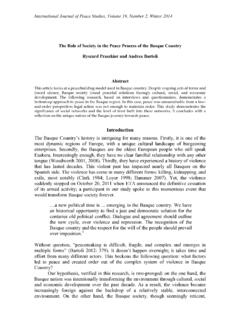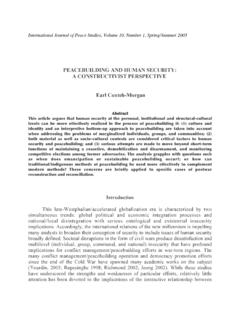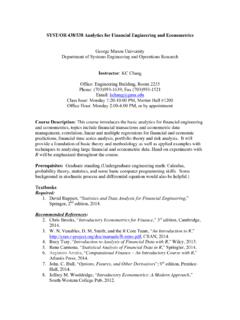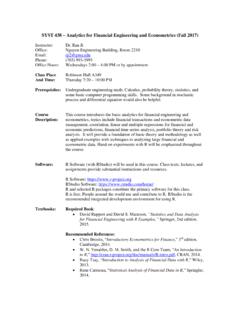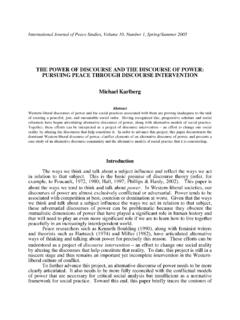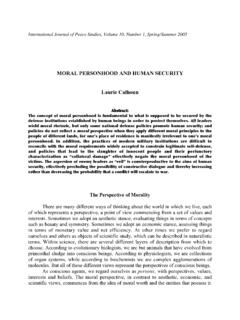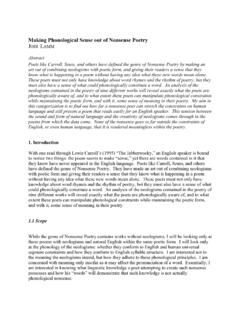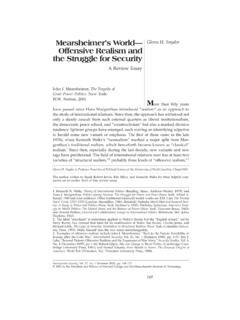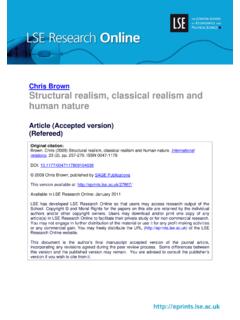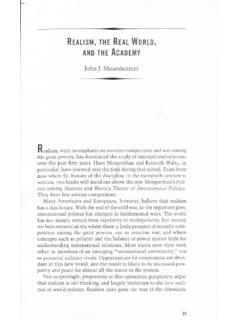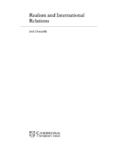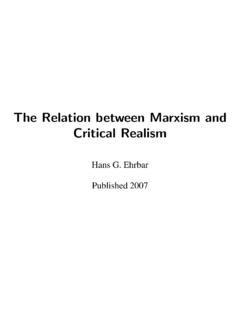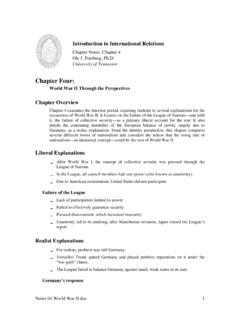Transcription of THEORIES OF CONFLICT AND THE IRAQ WAR Daniel Lieberfeld
1 international Journal of Peace Studies, Volume 10, Number 2, Autumn/Winter 2005 THEORIES OF CONFLICT AND THE iraq WAR Daniel Lieberfeld Abstract The article examines the decision to invade iraq from a range of analytic perspectives realism , liberalism, elite interests, ideological influences, and personal and social psychology in order to better understand the causes of the invasion decision and implications of the particular case study for general THEORIES of war causes. The analysis distinguishes among different types of causal influences and traces links among the various analytic perspectives.
2 The 2003 invasion of iraq has become the largest, longest, and most costly use of armed force by the United States since the Vietnam war. It is the first major post-Cold-war military action taken apart from an international organization and the first experience as an occupying power in a Middle Eastern country. Although the invasion decision is in some respects unprecedented, particularly concerning extensive military involvement in an Arab or Muslim country, the contention here is that the iraq invasion is not sui generis and can be usefully understood with reference to established THEORIES of war causes.
3 This article considers how THEORIES concerning the causes of war can help explain the decision. It explores how contending interpretations of this particular war can add to understanding of war causes generally, and also traces linkages among the theoretical perspectives. Table 1 summarizes the theoretical perspectives under discussion, beginning with realism , which, emphasizes motives related to national security, power, and resources. By contrast, liberalism considers differences between democracies and non-democracies to be a fundamental cause of war. Perspectives that emphasize sub-state interests highlight elites political, bureaucratic, and financial incentives for war.
4 Ideational perspectives consider how ideologies, beliefs, and worldviews contribute to war. This latter perspective overlaps, to an extent, with THEORIES of personality and social psychology, which attribute a causal role in CONFLICT to the attitudes and perceptions of the individuals and groups involved. Each of these broad categories comprises a variety of different theoretical perspectives. The article seeks to analyze a range of interpretations of causality that pertain to the invasion decision, and is not intended to be comprehensive. 2 THEORIES of CONFLICT and the iraq War Table 1.
5 Summary of Explanatory Perspectives on the iraq Invasion Theory Causal/explanatory focus realism Unipolarity, maintain hegemony and avoid post-9/11 decline by demonstrating willingness to use force Avoid nuclear proliferation, eliminate Iraqi WMD threat against the and its allies Gain regional military bases, pressure Syria and Iran, assist Israel Secure oil supplies, reduce energy vulnerabilities inspections are unreliable, sanctions policy causes resentment Liberalism Democracies fear that dictatorships will attack them first Security derives from spreading democracy and human rights Elite interests War for partisan political gain.
6 Divert public from failure to prevent 9/11 or capture al-Qaeda leaders, and from past ties to Saddam Hussein Vested interests ( energy corporations), war profiteering Interests of the defense bureaucracy and intelligence agencies Ideological influences Neoconservative belief in efficacy of unilateral force Orientalist beliefs about Middle Eastern peoples, and evangelical Christian beliefs concerning Israel Vengeful nationalism after 9/11 Personality and social psychology Bush s need to surpass father, family vendetta against Saddam Hussein Attractions of applying the Munich analogy to iraq Cognitive inability to adapt to a non-state adversary and reflexive resort to Cold war strategies and weaponry.
7 Ignorance of the Middle East Societal need for enemies realism realism helps to explain aspects of foreign policy that remain consistent over time. From a realist perspective, decisions by governments (or states ) to go to war are the product of all states involuntary participation in eternal quests for power and security due to an international political environment in which each state fears the actual or Daniel Lieberfeld 3 potential hostility of other states. Leaders rationally calculate war s costs and benefits in terms of their state s power and security. States international behavior thus reflects the constraints imposed on their actions by their relative power position.
8 In this regard, the shift from a two-superpower (bipolar) distribution of power during the Cold war to unipolar military dominance caused strategy to shift from policies of deterrence or containment of threats to policies of preventive warfare against threatening rogue states (Brooks and Wohlforth, 2002, 20-23). Unipolar dominance after the Soviet Union s collapse created incentives for the to deemphasize collective security and to rely more heavily on its own military: Given unrivalled power, realist theory predicts that any leader would view multilateral institutions as more of a hindrance than a help.
9 realism s emphasis on continuity and on the inevitability of military competition and war among sovereign states gains credence from the fact that, despite changes in leadership and despite the collapse of its main rival, the did not diminish its military spending after the end of the Cold war. Rather, the Clinton administration pursued an arms buildup so that militarily outspent any combination of potential rivals and, in addition, bombed Serbia without authorization. The Bush administration has been forthright about its goal of global hegemony a power so complete that challenging it becomes nearly inconceivable.
10 Bush s (2002a) West Point speech declared, America has, and intends to keep, military strengths beyond challenge. Given this strategic objective, overthrowing Saddam Hussein s government can be understood as an effort to enhance reputational and symbolic power beyond challenge particularly after the September 11, 2001 attacks that might have made the appear vulnerable. Moreover, once Bush publicly declared that regime change in iraq was a priority, the would have seemed weak had it accepted any compromise that left the Baathist regime intact. By staking the reputation for willingness to use force on achieving regime change, Bush made war nearly inevitable due to the national security interest in protecting that reputation.
